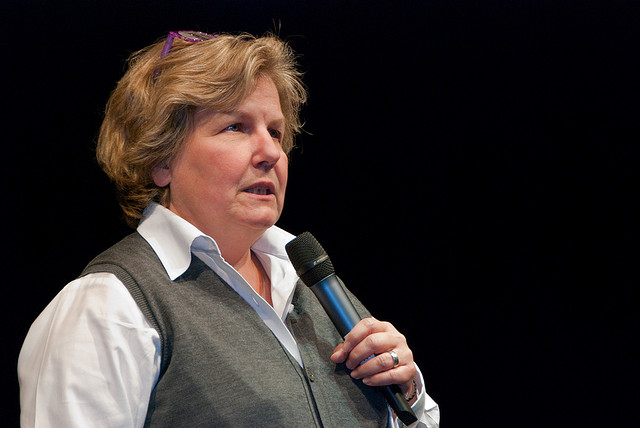The Women’s Equality Party will struggle to win seats, but it can push women’s issues up the political agenda
The Women’s Equality Party was founded earlier this year with the aim of promoting gender equality for the benefit of all. But what are its long term political prospects, and what hopes does it have of influencing those parties more likely to hold office? Kimberley Cowell-Meyers argues that while it may struggle to make an impact in an electoral sense, it may be able to use its significant media savvy – as evidenced by the presence of people like Catherine Mayer and Sandi Toksvig in its upper echelons – to push women’s issues up the political agenda.

The TV host and WEP leading light Sandi Toksvig (Credit: CC BY 2.0)
When the UK’s new Women’s Equality Party released its party manifesto last week, at least one article about the party appeared in almost every mainstream newspaper in the UK with The Independent running six separate pieces and The Guardian four. Even The Mirror and The Daily Mail got in on the action. This kind of media attention is essential if the party is to have any chance of overcoming the monumental challenges it faces to significantly impacting the political debate or improving the status of women.
The Women’s Equality Party is not unique in either its gender frame or its policy platform. More than 30 women’s parties have contested elections at the national level in Europe since 1990 and, in the 2014 European Parliament elections, women’s parties ran candidates in Sweden, Poland, France and Germany with the Swedish Feminist Initiative (F!) taking one seat. Since then, F! has launched a sister party in Norway to contest elections at the local, national and European levels. Furthermore, WE’s agenda emphasising equal representation, equal pay for equal work, equal distribution of domestic labour, equal educational opportunities and an end to violence against women, is entirely consistent with the pattern of women’s party advocacy in the more developed states in Western Europe.
What is fascinating about other women’s parties is that even small, marginal and short-lived women’s parties have, in other contexts, had important consequences for women’s descriptive and substantive representation. They have done this primarily, not by gaining large number of seats and crafting legislation, but by influencing the policy commitments and behaviour of the larger political parties. In the same way that the appearance of Green parties can have a contagious greening effect on other parties in the system or small right-wing parties like UKIP can cause mainstream parties to veer to the right, women’s parties can pressure the larger, more established parties to adopt their agenda.
Iceland’s Women’s Alliance was the largest, and arguably most influential women’s political party in Europe, drawing just over 10% of the electorate at the national level in the late 1980s and breaking male dominance in a system where the mainstream parties had paid scant attention to gender equity until that point. The NI Women’s Coalition, the UK’s only previous example of a women’s party, managed to alter the political platforms of the other parties and their recruitment and nomination of women as candidates. In Sweden, since 2014 F! has had a similar effect. Though the parties differ on how to solve the problems of women’s subordinate status in Sweden, the appearance of F! on the political stage, dramatically increased the attention paid to these problems in party manifestos across the political spectrum.
These examples of successful contagion, where the women’s parties pressured the mainstream parties to take up their issues and/or increase the number of women they nominated, occurred, however, in electoral systems that used some form of proportional representation. Invoking Duverger’s Law, the UK’s first-past-the-post electoral system means the Women’s Equality Party stands almost no chance of gaining seats in Westminster. Unlike UKIP, the SNP and the Liberal Democrats, WE cannot expect to attain sufficient electoral concentration in any region or district to gain more votes than any other party.
WE’s inability to challenge any of the other parties electorally undermines the operative logic of contagion, whereby parties adapt their platforms and behaviour in order not to lose votes to a competitor party. In cases where women’s parties have advanced women’s interests through pressuring the other parties, they posed a degree of threat, often in times of wider uncertainty, to the mainstream parties, which were eager to hold on to any and all voters. In short, due to the electoral system, WE cannot hope to effect politics in the same way as these other women’s parties. In addition, the current climate of a reinvigorated and confident Conservative Party and a left-leaning Labour Party dramatically reduced in stature, leaves little middle ground. This lessens the likelihood that the two main parties will borrow from each other or an innovating party.
WE may be able to win a handful of seats in local elections, despite the use of Single-Member-Plurality-Districts. WE may appeal in districts with high concentrations of voters who are well-educated and relatively well-off and for whom the party might represent something fresh, progressive and principled. This will bring them directly into competition with the Greens, who also champion gender equality, however.
Despite the use of PR, regional parliaments will be difficult to break into because women’s underrepresentation is less extreme in these bodies than in London. In Scotland, where the leaders of the three main parties are female, the party’s campaign to increase women’s access to power will have little appeal. That Wales achieved the world’s first gender equal parliament leaves little toehold for the party there and Northern Ireland has already experimented with a movement-party and seen it fold.
European office may be WE’s best electoral bet. As the case of F! in Sweden indicates, even where PR is used at all levels of government, gaining a seat in the European Parliament may be easier than gaining a seat in the national parliament. This is likely because the European Parliament is seen as a talking shop with little consequence. Gaining even one seat may validate WE’s strategy of striking out on their own but it will not change the fact that the parties will not fear WE encroaching on their voter base in the Westminster elections. Thus, while it might give WE a bully pulpit, it can’t translate into the kind of pressure on the other parties that was manifest in other contexts where women’s parties were able to blackmail the mainstream ones into adopting their issues.
WE’s best hope to achieve their goals is to use their significant media savvy to box the other parties in, forcing them to contend with the issues or appear to be standing still while society blows past them. There is a growing mood of frustration for a variety of reasons with the established parties, all of whom already at least give lip-service to gender equality. Pairing this with WE’s rapid acquisition of some 45,000 members within months of its founding, suggests there may be ample room to embarrass the parties by calling attention to the extent to which they are out of touch with what the people want.
WEP will be an interesting test case for the theory of contagion. Elsewhere, we have attributed contagion effects of small movement-parties to electoral pressure and the context of uncertainty. In the unlikely event that WE is able to change the commitments of the other parties without presenting an electoral challenge, this will introduce new theoretical mechanisms into consideration. And, it may encourage other women’s movements in other contexts to join the party!
—
Note: this post represents the views of the author, and not those of Democratic Audit or the LSE. Please read our comments policy before posting.
—
 Kimberly Cowell-Meyers is an Assistant Professor at the Department of Government in the School of Public Affairs at the American University, Washington D.C.
Kimberly Cowell-Meyers is an Assistant Professor at the Department of Government in the School of Public Affairs at the American University, Washington D.C.





 Democratic Audit's core funding is provided by the Joseph Rowntree Charitable Trust. Additional funding is provided by the London School of Economics.
Democratic Audit's core funding is provided by the Joseph Rowntree Charitable Trust. Additional funding is provided by the London School of Economics.
[…] This blog was originally posted on Democratic Audit UK. […]
The UK Women’s Equality Party as an agent of contagion?
https://t.co/7sAmnLkQ54
.@WEP_UK may be able to use its significant media savvy to push women’s issues up the political agenda https://t.co/n5uiJgDC8N
The Women’s Equality Party will struggle to win seats, but it can push women’s issues up the political agenda https://t.co/rkmYLYR1gV
The Women’s Equality Party will struggle to win seats, but it can push women’s issues up the political agenda https://t.co/VEjBHNt1ne
View from the USA of @WEP_UK and other women’s equality parties in Europe. #WE’re influential. Join us https://t.co/MwBKz9qwTm
The Women’s Equality Party will struggle to win seats, but it can push women’s issue up the political agenda https://t.co/Jy8PMmnJ1L
The Women’s Equality Party will struggle to win seats, but it can push women’s issue up the political agenda https://t.co/EItahjqoul
The Women’s Equality Party will struggle to win seats, but it can push women’s issues up the political agenda https://t.co/cxIukND04z
https://t.co/vRCuCzPa3Q
The Women’s Equality Party will struggle to win seats, but it can push women’s issue up the political agenda https://t.co/L4Mq6T4MbF
” @WEP_UK may appeal in districts with high concentrations of voters who are well-educated and relatively well-off https://t.co/lsuQCzdxcs
The Women’s Equality Party will struggle to win seats, but it can push women’s issue up the political agenda https://t.co/ylrriih16E
The Women’s Equality Party will struggle to win seats, but it can push women’s issue up the… https://t.co/QVVJJ0yg2C https://t.co/RU1NlPwroh